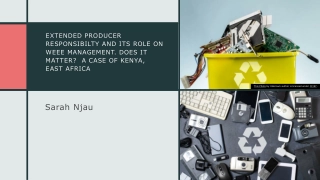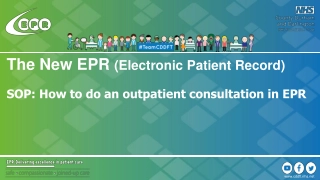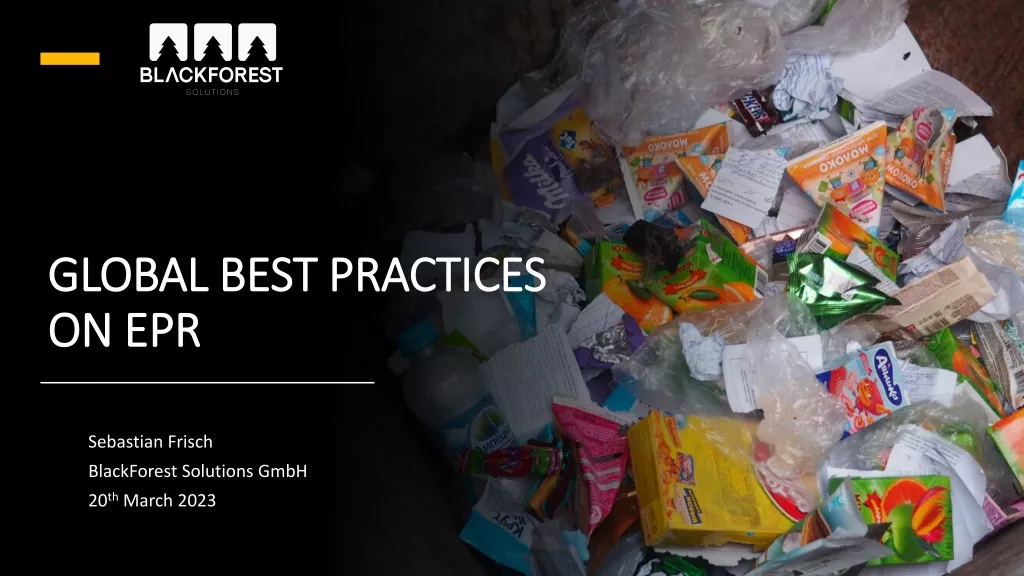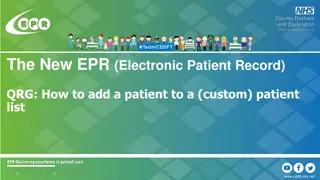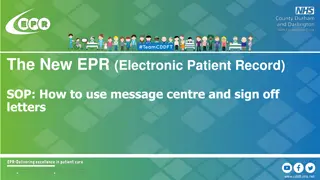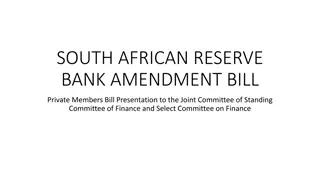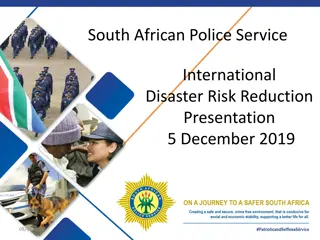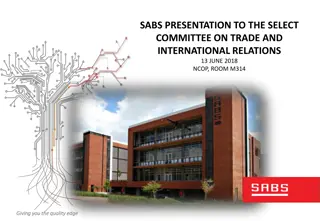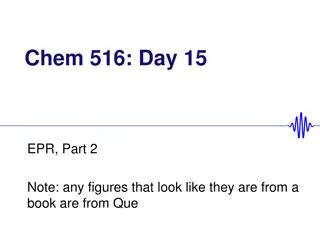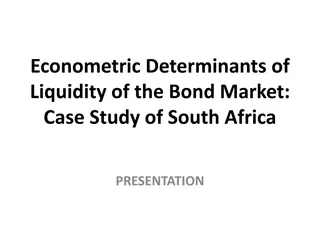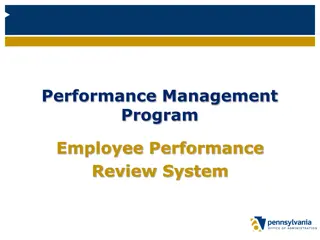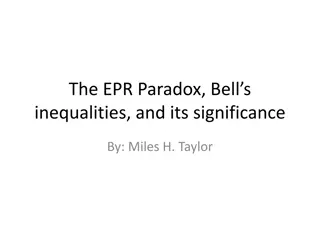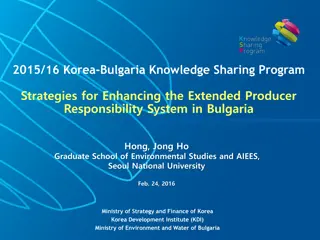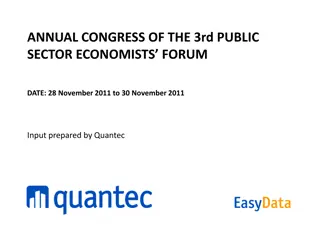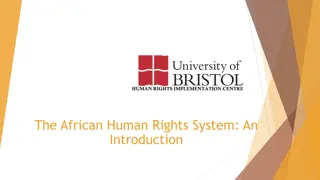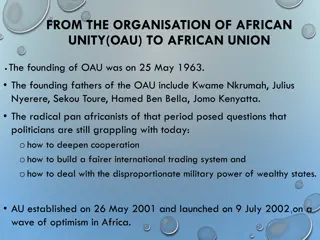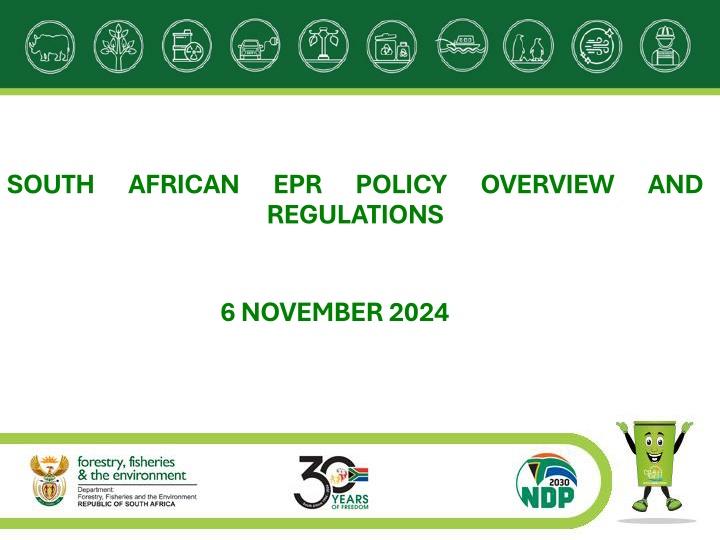
South African EPR Regulations & Policy Overview
This overview delves into South African EPR regulations and policy, highlighting key legal frameworks, such as the National Environmental Management: Waste Act. It explores the Sustainable Development Goals for pollution prevention and waste management, emphasizing the importance of sustainable practices and waste reduction. The Extended Producer Responsibility (EPR) regulations timeline from 2013 to 2023 is outlined, showcasing measures aimed at ensuring effective waste management and promoting circular economy initiatives.
Download Presentation

Please find below an Image/Link to download the presentation.
The content on the website is provided AS IS for your information and personal use only. It may not be sold, licensed, or shared on other websites without obtaining consent from the author. If you encounter any issues during the download, it is possible that the publisher has removed the file from their server.
You are allowed to download the files provided on this website for personal or commercial use, subject to the condition that they are used lawfully. All files are the property of their respective owners.
The content on the website is provided AS IS for your information and personal use only. It may not be sold, licensed, or shared on other websites without obtaining consent from the author.
E N D
Presentation Transcript
SOUTH AFRICAN EPR REGULATIONS POLICY OVERVIEW AND 6NOVEMBER 2024
Global Context: Sustainable Development Goals for Pollution Prevention and Waste Management The Sustainable Development Goals (SDGs) were adopted by the United Nations in 2015 as a universal call to action to end poverty, protect the planet, and ensure peace and prosperity by 2030 Achieving Economic growth and sustainable development requires that we urgently reduce our ecological footprint by changing the way we produce and consume goods and resources. Decoupling environmental impacts from economic growth The efficient management of our shared natural resources, and the way we dispose of toxic waste and pollutants, are important targets to achieve this goal. Goal 12: Encouraging industries, businesses and consumers to, by 2030, substantially reduce waste generation through prevention, reduction, recycling and reuse and move towards more sustainable patterns of consumption and production
South African Policy Context: Section 24 of the Constitution, NEMWA, NWMS Everyone has the right To an environment that is not harmful to their health or well-being To have the environment protected for the benefit of present and future generations through reasonable legislative and other measures that: I. Prevent pollution and ecological degradation II. Promote conservation III. Secure ecologically sustainable development and use of natural resources while promoting justifiable economic development Key Enabling Policy and Legislation: National Environmental Management: Waste Act (No 59 of 2008) National Development Plan National Waste Management Strategy National Pricing Strategy
EPR Policy and Regulations Timeline 2013 to 2023 EPR Notices for lubricant oils, pesticides and portable batteries came into effect from 23 March 2023 EPR Notices for Paper and Packaging, Electrical and Electronic Equipment and Lighting came into effect in Nov 2021 (Section 18 of the Waste Act) Extended Producer Responsibility Regulations (Nov 2020) Tyre Plan Government managed scheme (2017) National Environmental Management: Waste Act (No 59 of 2008) Amended EPR Regulations published May 2021 for implementation Section 13A National Pricing Strategy (August 2016)
EPR Regulations providesa framework to ensure the effective and efficient management of the identified end-of-life products; and To encourage and enable the implementation of chemicals and waste economy and circular economy initiatives Key measures to be implemented by producers include amongst others, to: develop and establish secondary markets for recycled content; transformation and integrate the informal sector into the post consumer waste collection value chain New notices gazetted in March 2023 for: Lubricant Oils; Batteries; Pesticides Under implementation: Waste Tyres (Section 29 Government Managed Scheme) EPR Scheme for Paper, Packaging and some single use products EPR Scheme for Electrical and Electronic Equipment EPR Scheme for the Lighting sector
STRUCTURE OF EPR REGULATIONS 1. Definitions Producer 2. Purpose of the Regulations 3. Application of the Regulations identified products, exports exempted 4. Registration of producers 5. Extended producer responsibility measures to be implemented. Obligations of producers and producer responsibility organisations 6. Minimum requirements and criteria for extended producer responsibility schemes to operate incl design for recyclability, waste reduction, reuse, recycling recovery, treatment, disposal (waste hierarchy) and contribute to job creation and econ growth 7. Financial arrangements for an extended producer responsibility scheme EPR Fees 8. Monitoring, reporting and evaluation Performance and financial reports 9. Performance review of the extended producer responsibility scheme mandatory 5 year reviews by department, ad hoc reviews as deemed appropriate 10. Registration of producer responsibility organisations 11. Requirements for producer responsibility organisations non-profit organisations 12. Offences 13. Penalties
1. Definitions Producer and Producer responsibility organisations producer"means any person or category of persons or a brand owner who is engaged in the commercial manufacture, conversion, refurbishment (where applicable) or import of new and / or used identified products as identified by the Minister by Notice in the Government Gazette in terms of section 18(1) of the Act, and a producer includes, where relevant, the same as defined in the specific section 18 Notices for each of the identified products as gazetted by the Minister in terms of section 18(1) and (2) of the Act; "producer responsibility organisation" means a not-for-profit company established by producers or any person operating in any of the industrial sectors covered in the Notices published in terms of the Act to support the implementation of their extended producer responsibility scheme and may represent either individual or collective producers;
3,4 and 10. Scope of EPR Regulations and Reg Registration Scope of EPR regulations (reg 3): Applies to identified products in terms of section 18(1)(a) of the Waste Act; Toproducers of those identified products published in the government gazette; and Identified products placed on market prior to the regulations coming into effect. Registration of producers (4) and producer responsibility organisations (10) -- Existing producers and PROs to register with the department within 6 months of publication of the government notice New producers and newly established PROs to register within 3 months of being established
EPR REGISTRATIONS Total number of Producers and PROs Registered on EPR system (as of 27 August 2024) Portable BatteriesPesticidesLubricant Sector EEE Lighting P&P Total Oil PRO 8 6 32 2 1 5 54 Producer 235 71 1 199 9 95 31 1 640 Total 243 77 1231 11 96 36 1 694
5. EPR Measures to be implemented by producers The producer of a product or class of products, must- establish and implement an extended producer responsibility scheme or join another extended producer responsibility scheme or appoint a producer responsibility organisation to establish and implement an extended producer responsibility scheme that includes the entire value chain; be accountable for the operation and performance of their extended producer responsibility scheme; conduct a life cycle assessment, in relation to the identified product, in accordance with the applicable standards within 5 years of implementation of their extended producer responsibility scheme; through the life cycle assessment as a minimum focus on the following: (i) Minimisation of material used in the identified product; (ii) Design of the product to facilitate reuse; recycling or recovery, without compromising the functionality of the product; and (iii) Reduction of environmental toxicity of the resulting post -consumer waste stream; Implement environmental labels and declaration of the identified products aligned with the SANS 14021 and 14024 standards within a period of 3 years
5A-B. OBLIGATIONS OF PROs AND PRODUCERS THAT ESTABLISH EPR SCHEMES Contract for the collection, recycling and recovery of the identified products through a fair and transparent process Manage services rendered by service providers including the collection and recycling by waste management companies. Co-operate with all municipalities (where applicable), within 3 years of implementation of their extended producer responsibility scheme, to increase the recovery of identified products from municipal waste. Integrate informal waste collectors, reclaimers and pickers into the post consumer collection value chain Develop and establish secondary markets for recycled content;
5A-B. OBLIGATIONS OF PROs AND PRODUCERS THAT ESTABLISH EPR SCHEMES (2) Utilise existing infrastructure across extended producer responsibility schemes in a collaborative manner where feasible or establish and operate new infrastructure within 3 years of completion of feasibility studies; initial feasibility to be undertaken within 2years of implementation of the scheme identifying need for additional infrastructure. Compensate waste collectors, reclaimers or pickers, who register with the National Registration Database for collection services and environmental benefits through the collection service fee by Nov 2022. The collection service fee shall be reviewed by the department annually. Implement transformation within those entities with whom they contract, with a special focus on women, youth and persons living with disabilities Prioritise the promotion of small businesses and entrepreneurs with a special focus on women, youth and persons living with disabilities.
EPR Regulations 7: Financial Arrangements EPR Fees "7(1) The producer responsibility organisation that establishes and implements an extended producer responsibility scheme must, together with its members, determine the proposed extended producer responsibility fee and apply the extended producer fee proportionally to all members based on the identified products placed on the market. "(2) The proposed extended producer responsibility fee must be submitted electronically to the Minister, including the motivation, justification and any other relevant information, who must obtain concurrence on the proposed extended producer responsibility fee from the Minister responsible for finance within 60 days of submission. "
Reg 7(7)(b). Administration costs for EPR Schemes 20% of the revenue collected in calendar year 1 of implementation; 15% of the revenue collected in calendar year 2 of implementation; and 12% of the revenue collected in calendar year 3 of implementation
Regulation 5, 7 & 8 EPR Reporting Requirements Internal biannual financial audit report : Reg 5A (b) & Reg 5B(b) to be made available to the Department on request and to the external auditor ( independent financial auditor). External annual financial audit report: Reg 5A(e) & 5B(e) to be submitted to the Department within 60 days after finalisation of the audit and its summary (summary audit report) uploaded onto the SAWIC for public access. Annual financial plan and budget: Reg 7(5) & 7A (5) & (6) submitted by 30 November for the following year. Interim performance report: Reg 8(1)(a) within four (4) weeks of the conclusion of the 6 months period Annual performance audit report/External annual performance audit report Reg 8(1)(c)(d) within three months of the conclusion of the year-end.
Annual External Performance Reports for 2022 On 31 March 2023, 21 annual performance audit reports were submitted by registered PROs and some producers. This comprises of five (5) producers that implement their own Extended Producer Responsibility (EPR) schemes. The Department has reviewed the reports for compliance with the EPR Regulations and the published targets in the Notices. Feedback letters containing the findings from the review were sent to PROs Follow up one on one meetings were set up with individusl PROs and producers implementing their own EPR scheme.
12. OFFENCES (1) A person commits an offence if that person contravenes or fails to comply with regulations 4(1) and (2), 5, 5A, 5B, 6, 7(1), 7(2), 7(3), 7(4), 7(5), 7(6), 7(7), 7A, 8(1)(a), 8(1)(b), 8(1)(c), 8(1)(d), 8(1)(e), 8(2)(a), 8(2)(b), 8(2)(c), 8(2)(d), 8(2)(e), 9(3), 10 or 11 of these Regulations; (2) A producer responsibility organisation commits an offence if that producer responsibility organisation contravenes or fails to comply with regulations 4(1) and (2), 5, 5A, 5B, 6, 7(1), 7(2), 7(3), 7(4), 7(5), 7(6), 7(7), 7A, 8(1)(a), 8(1)(b), 8(1)(c), 8(1)(d), 8(1)(e), 8(2)(a), 8(2)(b),8(2)(c), 8(2)(d), 8(2)(e),9(3), 10 or 11 of these Regulations.
Summary of main requirements ito of EPR Regulations Name of regulation Offence Reg 4 and 10 Registration of producers and PROs X Reg 5A and 5B obligations of PROs and producers establishing EPR schemes X Reg 6 Minimum requirements and criteria for EPR schemes to operate and their contribution to inclusive economic growth and job creation. X Reg 7 Financial arrangements (1) Determination of EPR fees (2) Submission of EPR fee motivation to Minister, Min seeks concurrence of MoF (3) Criteria for determining fees including various costs to be included (4) Publication of EPR fee on the website (5) Submission of annual financial plan and budget (7) Administration costs specifies max administration costs allowed X Reg 7A Financial obligations of the producer implementing its own scheme Regulation 8 Reporting requirements for PROs and producers Interim performance report Annual external performance audit report Performance to be measured against the individual targets set out in the relevant government notice ie. Paper and packaging, lighting and electrical and electronic waste X Reg 9 Performance review of the EPR scheme X Reg 11 PRO governance structure x
EPR Annual & Interim Performance Reports The Department has completed the review of 2023 annual external performance audit reports for the Paper & Packaging, Lighting and Electrical & electronic equipment sectors for compliance with the EPR Regulations and the published targets in the three (3) Notices. The Department is currently conducting verification audits with the PROs. Formal feedback letters communicating the findings of the reviews will be sent to PROs, Follow up one-on-one (bilateral) meetings will be set up with PROs and producers to discuss the findings and agree on measures to remedy the non- compliances and timelines for the implementation of those measures. A total of 22 interim performance reports for 2024 were submitted to the Department for review by the registered PROs and Producer running their own EPR schemes by 31 July 2024 across the six (6) sectors :Paper & Packaging, Lighting and Electrical & electronic equipment, Pesticides, Lubricant oils and Portable batteries sectors
Compliance and Enforcement Categories of non-compliance identified below with proposed enforcement action: (different approaches for different categories of non-compliance) Free riders - Pre-compliance Notices and final compliance notices to be issued Failure to register after condonation letters were issued - Pre-compliance Notices and final compliance notices to be issued Registered but not reporting - process underway to identify producers / PROs Registered, reporting but failure to meet targets - collaborative approach outlined below Phase 1 collaborative approach Formal feedback letters to be sent to PROs/producers communicating preliminary findings of the review of annual external audit performance reports. The Department will engage the PROs/producers on performance reports, findings of review and consider and agree on a) measures to remedy non-compliance and b) timeframes for implementation of measures Follow up engagements will be held to assess whether remedial measures were successfully implemented. If unsuccessful Phase 2 C&E led formal, stricter enforcement, punitive measures
THANK YOU! Ms Mamogala Musekene Deputy Director-General: Chemicals and Waste Management Department of Forestry, Fisheries and the Environment E-mail: MJMusekene@dffe.gov.za Website: http://www.environment.gov.za Address: The Environment House, 473 Steve Biko Road, Arcadia, Pretoria, 0083

